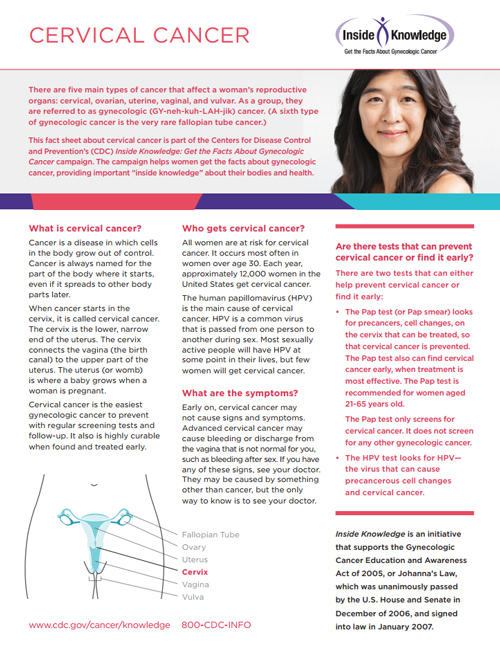January is National Cervical Health Awareness Month. It’s a perfect time to remind your loved ones to get screened and, if they haven’t already, get vaccinated.
According to the National Cervical Cancer Coalition (NCCC), “…nearly 13,000 women in the United States are diagnosed with cervical cancer each year.” [1] Sadly, 4,000 women will die from the disease. It’s actually the second most common type of cancer in women. But with regular screening, we can often find potential problems and begin early treatment.
What is exactly is cervical cancer?
Cervical cancer occurs in the cervix—the opening between the vagina and the uterus. The NCCC states that, “most cervical cancers (80 to 90 percent) are squamous cell cancers. Adenocarcinoma is the second most common type of cervical cancer, accounting for the remaining 10 to 20 percent of cases.”
How do I get cervical cancer?
Have you heard of HPV, or the human papillomavirus? HPV is present is about 99 percent of people with cervical cancer. HPV is super common. Studies show it’s the most common type of sexually transmitted infection, and that about 80 percent of women are infected with HPV by the time they’re 50 years old. [2] Fortunately, most women who have HPV don’t get cervical cancer, but the risk is still present.
What can I do to prevent cervical cancer?
You can’t always prevent cervical cancer, but you can take steps to significantly decrease your chances of contracting the disease. First, get a regular Pap test. Second, get the HPV vaccine series. The Centers for Disease Control and Prevention (CDC) recommend “preteens (both boys and girls) aged 11 to 12 years,” get the vaccine, but that the vaccine can be also “be given as early as age 9 and until age 26.” [3]
How can I help?
This month, join us in helping the NCCC to spread the word about cervical health screening on social media. Use hashtag #CervicalHealthMonth and retweet or repost any of the content available on the NCCC website.
Resources:
- http://www.nccc-online.org/hpvcervical-cancer/cervical-health-awareness-month/
- http://www.nccc-online.org/hpvcervical-cancer/cervical-cancer-overview/
- https://www.cdc.gov/cancer/cervical/basic_info/prevention.htm
- https://www.cdc.gov/cancer/cervical/pdf/cervical_facts.pdf


